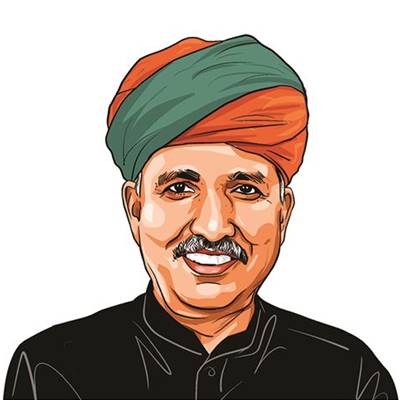Opinion The inspiration for New India: The unsung martyrs of Mangarh
More than 1,500 tribal freedom fighters died, battling colonial rule. India's growth story was incomplete when the tribals were left behind. In New India, the community must have a prominent place
 Born in a nomadic community in the Dungarpur-Banswara region of Rajasthan, Govind Guru was influenced by the teachings of Swami Dayanand Saraswati to work for the socio-religious upliftment of people from the Bhil community.
Born in a nomadic community in the Dungarpur-Banswara region of Rajasthan, Govind Guru was influenced by the teachings of Swami Dayanand Saraswati to work for the socio-religious upliftment of people from the Bhil community.
The Azadi Ka Amrit Mahotsav is an apt occasion to introspect and motivate people to make sure the nation scales new heights. Several heroes who sacrificed their lives for the country during the freedom struggle have remained unsung. On November 15, the country celebrated the second Janjatiya Gaurav Divas, the birth anniversary of Birsa Munda, by recollecting the valour of tribal freedom fighters. Today, we pay our respects to the courageous tribal martyrs led by Govind Guru, who fought the British rulers in the early 20th century.
Born in a nomadic community in the Dungarpur-Banswara region of Rajasthan, Govind Guru was influenced by the teachings of Swami Dayanand Saraswati to work for the socio-religious upliftment of people from the Bhil community. While the colonial state was engaged in an organised loot of India’s resources, Govind Guru drew from Indian traditions and ideals to promote harmony amongst the tribal communities. He was 25 when he founded the Samp Sabha for this purpose in 1883. From 1903 onwards, Mangarh hill became famous for an annual congregation of the Bhils and other tribal groups in the region.
At that time, the demand for self-rule was gathering currency amongst the people of the country. The divide-and-rule policy of the British, the Bengal Partition and the drain of wealth from the country had dented the moral foundation of British rule. Govind Guru demanded that the colonial state reduce the revenue rate during famines and stop encroaching on the religious freedom of tribal communities and harming their culture. The Bhils and other tribals were engaged in a long standoff with the British. On November 17, 1913, a full moon day, Mangarh hill witnessed a mass gathering of more than 1.5 lakh Bhils. They swore allegiance to their guru and sought to fulfil their spiritual desires. The gathering also resolved to find ways to end the British hegemony, especially the unjust revenue regime.
‘Bhuretia Nahi Manu Re’ (I will not accept the tyrannical rule of white people), the song of the tribal people has, since then, become an anthem of sorts for them. Govind Guru’s calls for protesting against the injustice of the colonial rulers laid the foundation of the Civil Disobedience Movement.
Sensing trouble from the congregation, the British deputed seven companies to surround the Mangarh hill and tried to suppress the tribals with the fear of bullets and cannons. But the brave tribals could not be subdued. Their awakened consciousness and new-found spirituality had raised their confidence and the desire to protect the motherland overwhelmed the fear of the bullet.
The British ordered a mass shooting, and because of this inhuman act, more than 1,500 tribal freedom fighters died on November 17. The moral legitimacy of the British kept on eroding, especially after the Jallianwala Bagh massacre of 1919.
The sacrifices of these unsung heroes increased the moral quotient of the national movement. People began to see a stake in the country’s freedom. The spirit of taking ownership of the country’s welfare has passed down to people after the country gained Independence.
After 75 years of Independence, Prime Minister Narendra Modi gave a call for Amrit Kaal’s “Panch Pran”. This involves removing traces of the colonial mindset, taking pride in our roots, inculcating unity and a sense of duty and improving the well-being of the nation. The role of tribal communities during the freedom struggle and nation-building provides inspiration for this endeavour. The environment-friendly lifestyle of these communities and their zeal to protect nature offer valuable lessons to people from the elite class and developed countries who are currently discussing ways to reduce carbon footprints.
The ‘Mangarh Dham Ki Gaurav Gatha’ event on November 1 saw the presence of PM Narendra Modi, the chief ministers of Rajasthan, Madhya Pradesh and Gujarat, and, more importantly, the descendants of the tribal freedom fighters who had assembled in 1913 on the hill. Mangarh Dham will be developed as a joint project of the governments of Rajasthan, Gujarat, Madhya Pradesh and Maharashtra. It will be a national memorial showcasing tribal legacy and their rich cultural heritage. This will be a significant milestone in recognising tribal contribution in nation-building. The government is already setting up tribal museums in 10 states — Arunachal Pradesh, Manipur, Mizoram, MP, Chattisgarh, Jharkhand, Gujarat, Andhra Pradesh, Goa and Kerala — to raise awareness about the sacrifices made by tribals during the freedom struggle.
India’s growth story was incomplete when the tribals were left behind. Now, as a result of the initiatives taken by the Modi government, these communities have a prominent place in the government’s development agenda. Droupadi Murmu taking over as the President of India is a landmark in the country’s history. The Union Council of Ministers has eight tribal ministers.
The pro-poor welfare policies, people-centric measures, Eklavya Model residential schools, scholarship schemes for students and health schemes of the government have imparted a new meaning to the idea of social justice. Today, as we pay our homage to the martyrs of Mangarh, let’s align our values with those of the freedom fighters and build a New India — a global leader that is a pragmatic trouble-shooter of contemporary international challenges.
The writer is Union Minister of State for culture and parliamentary Affairs and represents the Bikaner constituency in the Lok Sabha






